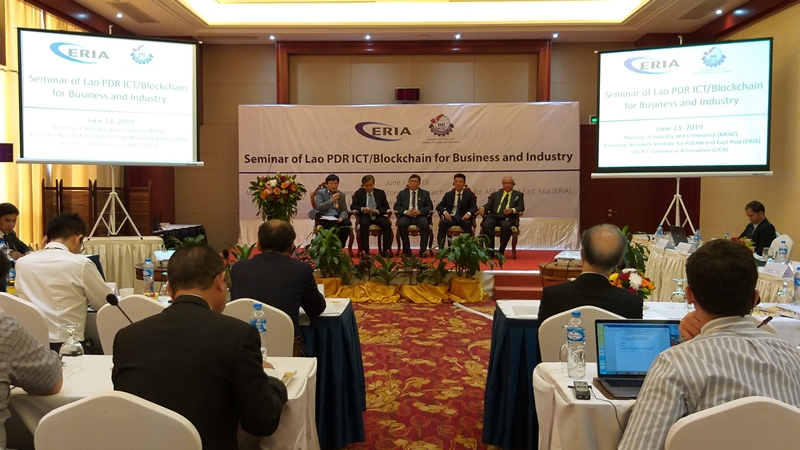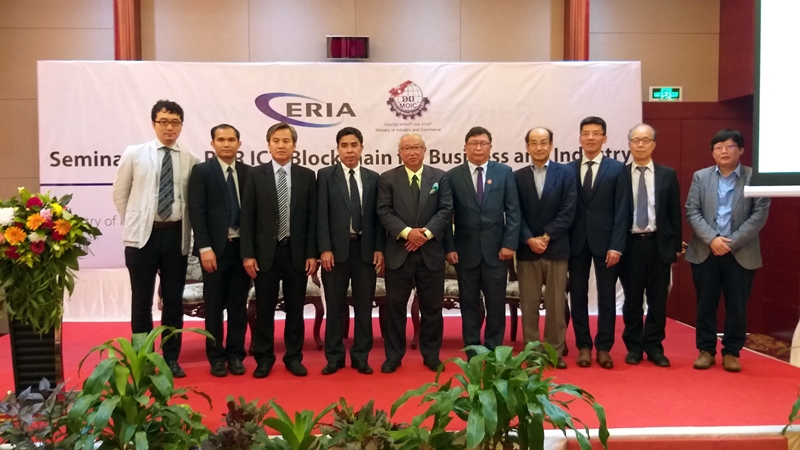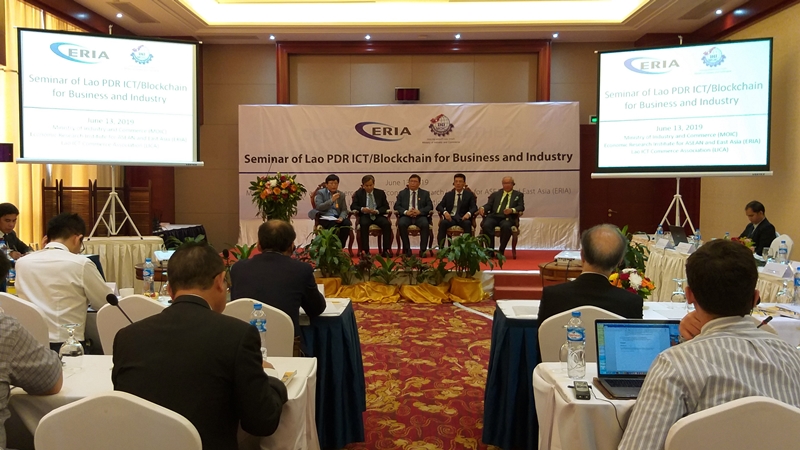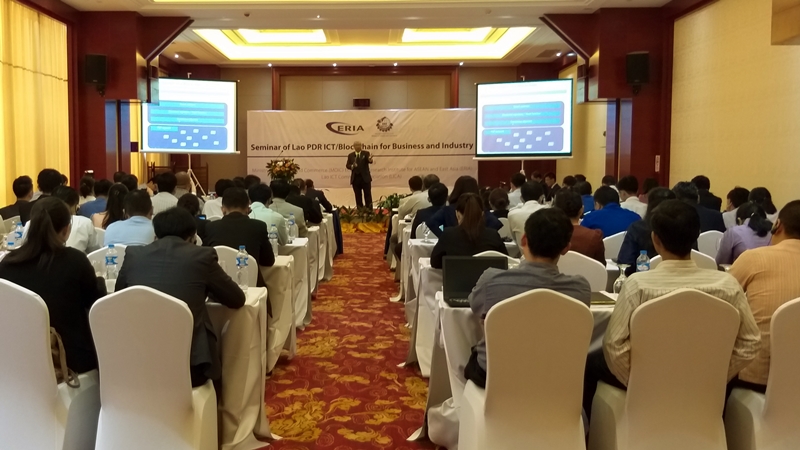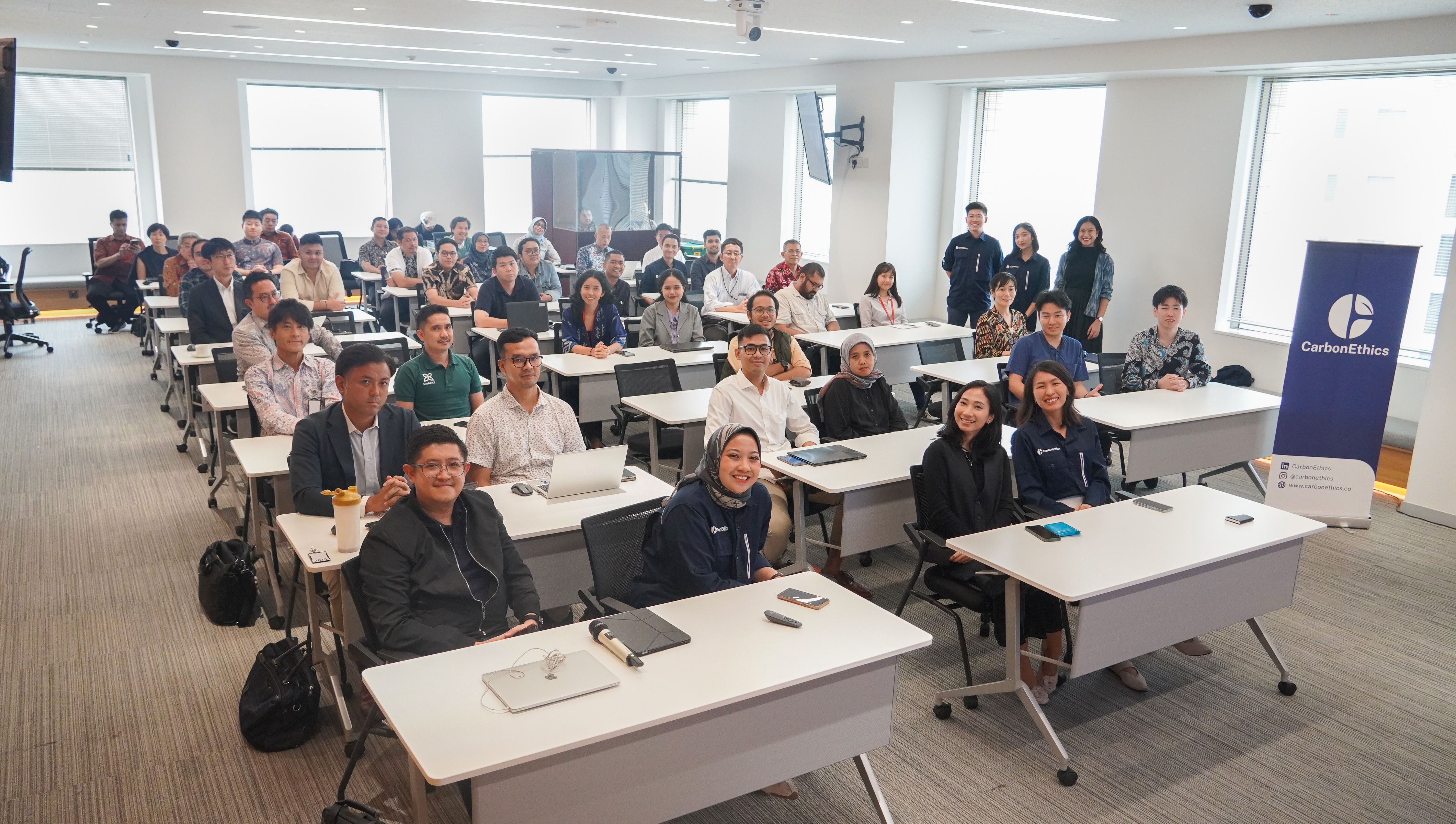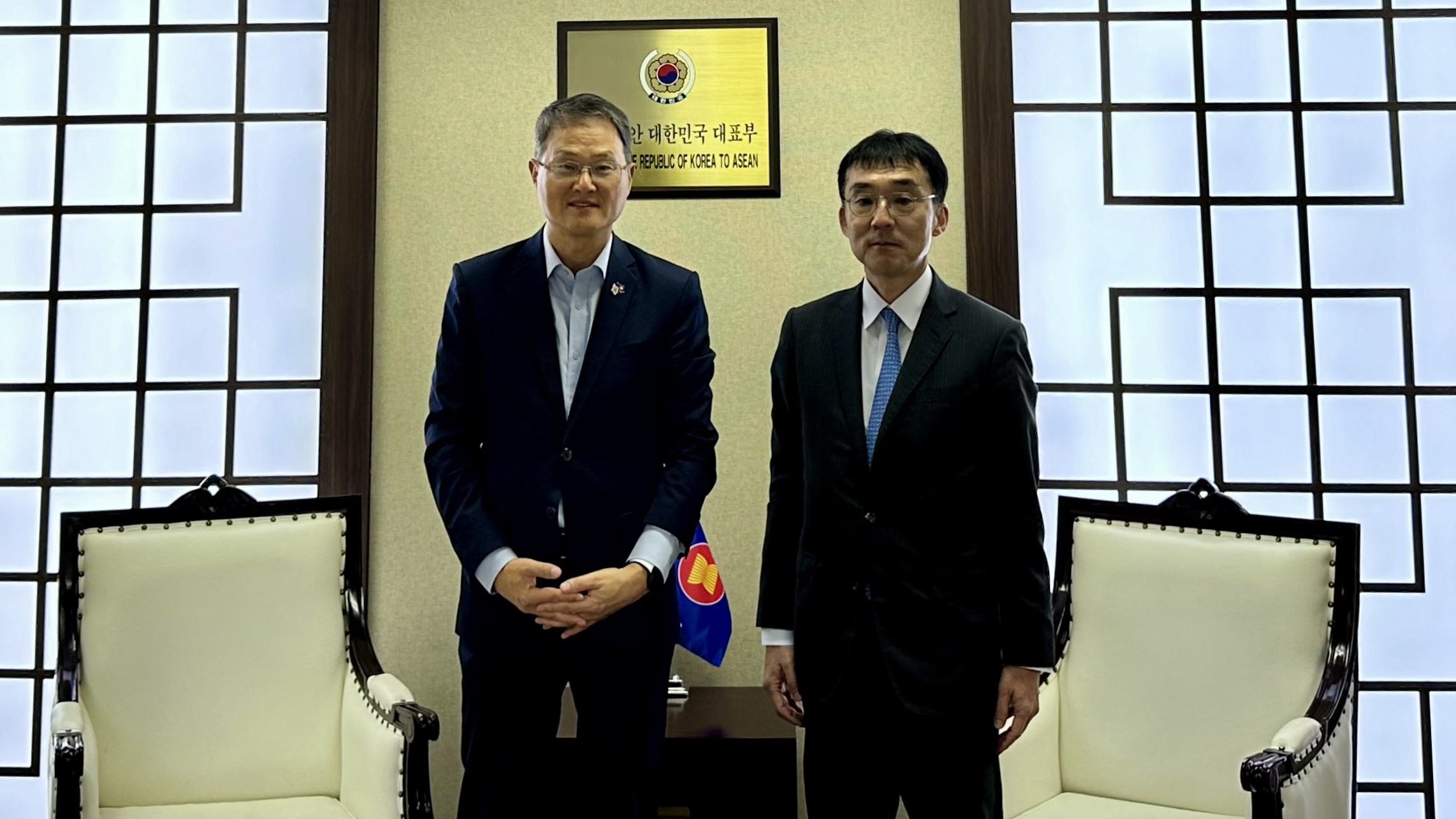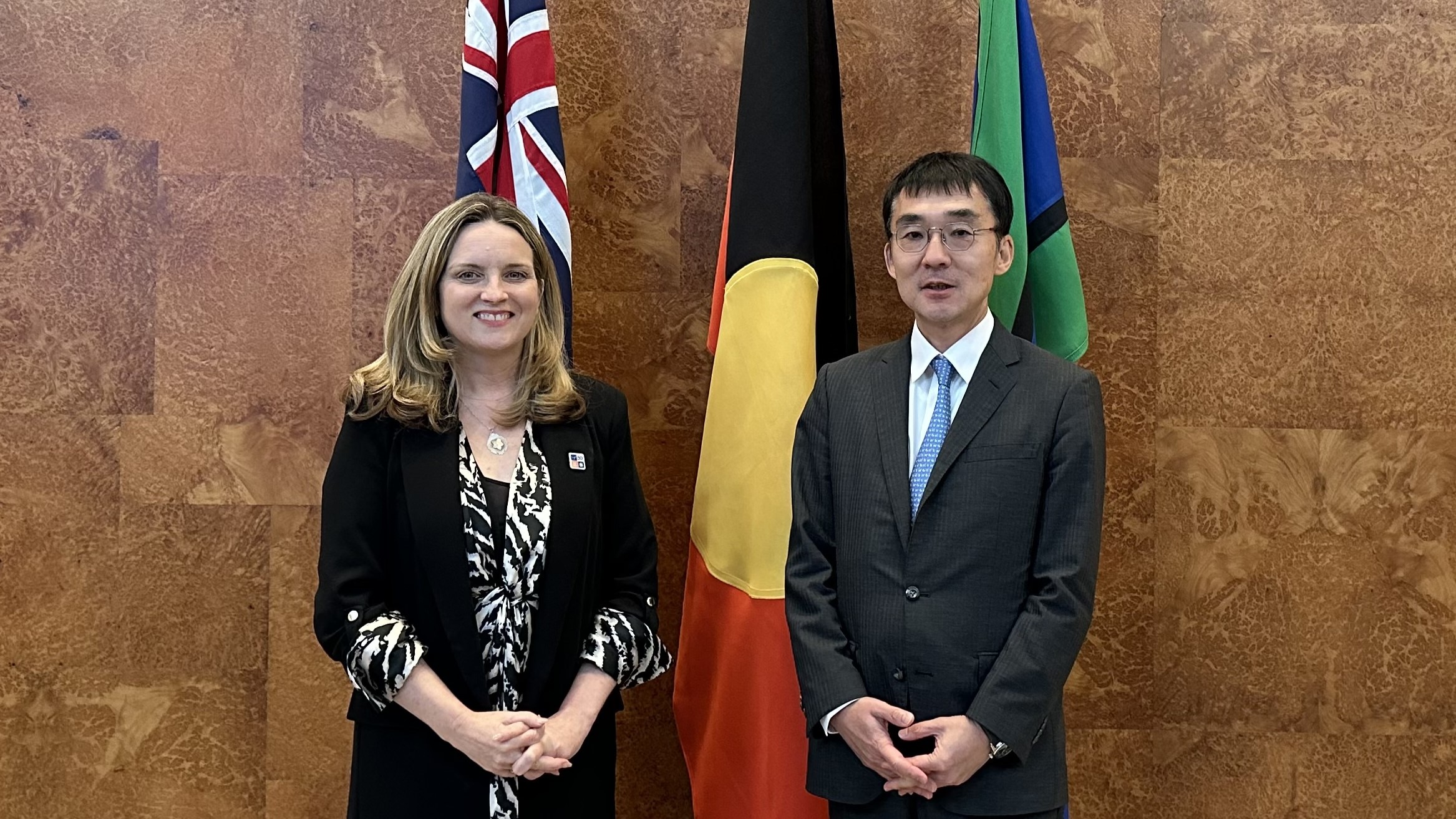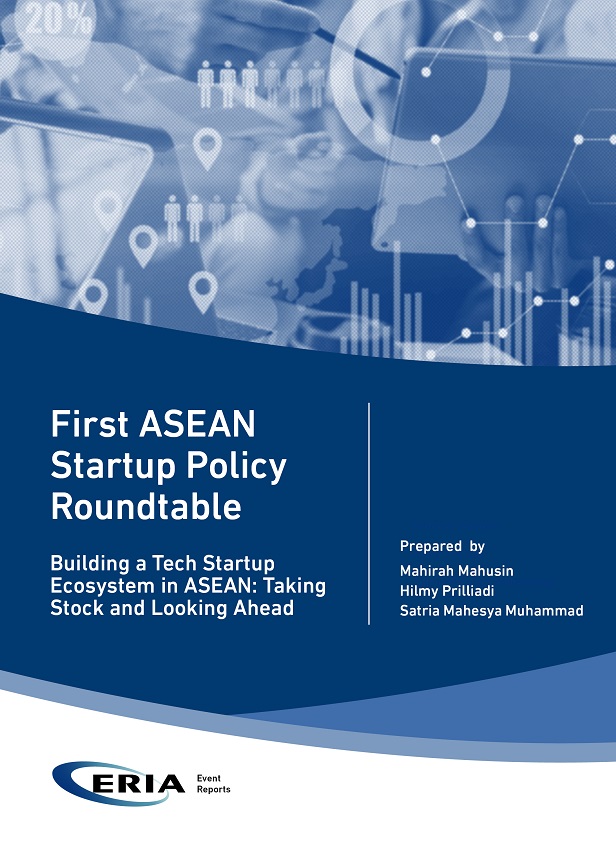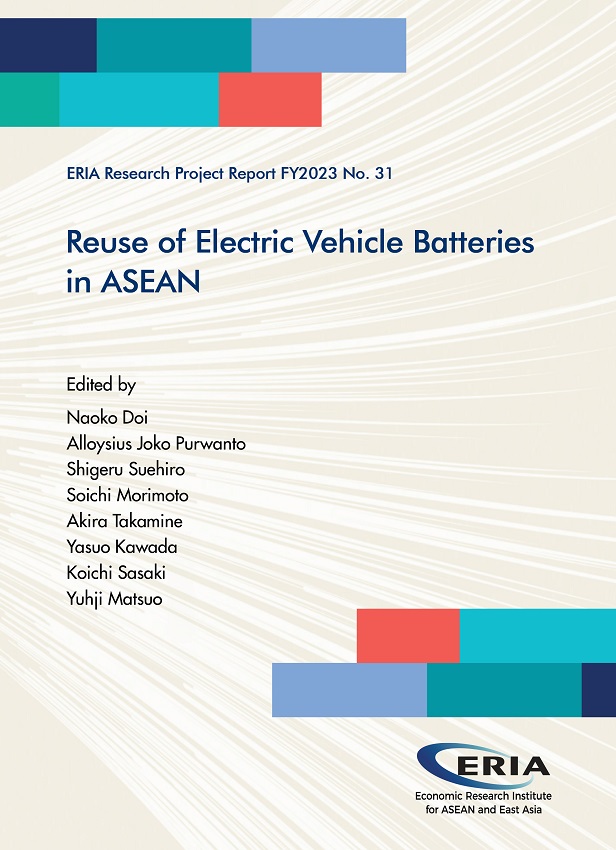Lao Business and Industry to Benefit from ICT and Blockchains
Date:
18 June 2019Category:
NewsShare Article:
Print Article:
Vientiane, 13 June 2019: Lao businesses and government need to work together to realise the potential benefits of information and communications technology (ICT) and blockchains. That was the main message from the seminar hosted by the Economic Research Institute for ASEAN and East Asia (ERIA) jointly with the Ministry of Industry and Commerce (MOIC) and the Lao ICT Commerce Association (LICA) in Vientiane on 13 June 2019.
The seminar topics included Lao PDR’s development plan for ICT, the use of ICT in business development and e-commerce, and the ability for blockchains to support small-medium enterprise (SME) financing.
Mr Samly Boutsady, Deputy Director General of MOIC began the seminar with opening remarks pertaining to Lao’s positive outlook in modernising ICT throughout the country. Upon the completion of his remarks, he welcomed the valuable insights of all the participants in their collective effort to strengthen Lao.
Dr Somphaivan Sengsouliya, Deputy Director General of E-Government Center at MPT, delivered the keynote speech. He presented the modernization plan for ICT in Lao, and the current status of the technology throughout the country, stating that ‘[the government of Lao] has a strategic plan for ICT Development. Digitalisation of government services is essential.’ He expanded his comments to highlight that there is a large amount of space for improvement. ‘Lao PDR communications infrastructure at the moment has established a 2G system that covers 95% of total villages. 4G is at approximately 45%. Coverage expansion is vital to a strong ICT infrastructure,’ he said.
Dr Sengsouliya concluded his presentation championing the recent success in the development of e-governance systems to improve quality of life and government services. Supporting Lao people with e-portal access to government documentation, early alert disaster systems, and the creation of e-banking an e-payment system complements the larger trends of global digitisation. These steps will serve as a precursor to the development of greater cloud storage/computing, as well as data and mobile driven solutions, steering Lao towards an applications programming interface economy.
When questioned about the role of blockchain in the development of Lao PDR, Dr Sengsouliya responded that the technology is ‘not only for digital currency, it is a tool to improving access to information and infrastructure. It can be used to promote and therefore develop technology skills. Actions need to be taken to drive forward innovation and to support this technological growth. National data centre updates, high speed connections, and e-governance, will support this reality.’
The first presentation following the keynote speech was led by Mr Thanongsinh Kanlaya, President of the LICA. Building upon the comments of Dr Sengsouliya, Mr Thanongsinh discussed the role of LICA in expanding the interest of ICT service providers, influencing legislation, and creating international standards. He shared his vision for Lao PDR, stating that Lao’s geographically advantageous position ‘bordering so many countries can result in Lao being a [regional] centre for ICT infrastructure…however, their needs to be incentives to integrate technology into complementary industries, especially those sceptical of its impacts on employment.’
ERIA Economist, Dr Lurong Chen, sought to advance the discussion to capture the benefits of digitalization for micro, small, medium enterprises (MSME) in Lao PDR. Dr Chen provided an overview of the historical evolution of industrial and economic globalisation as three unbundlings of economic and industrial order. The 1st unbundling focused on the separation of production and consumption. The 2nd unbundling occurred within production itself, demonstrating that production does not need to be an integrated process. The 3rd, and current, unbundling is being driven by digitalisation. The 3rd unbundling focuses on the facilitation of the movement of skills and purpose, fragmenting tasks. This leads to mass innovation shifting towards mass customisation.
The power of digitalisation and the fragmentation of tasks improves the capacity and access to resources and information for market participants. Production and task division expands marketing opportunities and employment opportunities. Operations, trade, and capital costs decline as external and internal shocks and knowledge gaps lessen. However, barriers internally and externally persist in efforts to encourage digital adoption. Affordability, the rate of rapid technological change, technological knowledge gaps, security, and ICT infrastructure development concerns can slow the process of adoption. Despite these barriers, Lao PDR shows great potential in developing ICT on the firm level and within business-to-business and business-to-consumer transactions.
Prof Mitsuhiro Maeda, Professor, Advanced Institute of Industrial Technology, gave a special lecture on the importance of blockchain, related business and SME Finance. Initially explaining the technical workings of blockchain technologies, Professor Maeda highlighted opportunities to apply this technology to create new financial schemes for SMEs and to reduce the prevalence of market failures in current financing. He emphasised the application of blockchain technology to real businesses, such as SME finance by credit banks, food safety management, and energy trading systems. Using Japanese financing structures as a case-study, the professor demonstrated how blockchain technologies can be applied in certain systems of community financing, corporate bond market infrastructure, and equity investment infrastructure, but not others. To conclude his presentation, Professor Maeda explained that there are already current applications of blockchain in food safety management, peer-to-peer energy trading, and low-carbon city management.
The seminar speakers participated in a final panel discussion moderated by Mr Souknilanh Keola, Researcher, Bangkok Research Center, Institute Developing Economies─Japan External Trade Organization to recapitulate and elaborate upon their corresponding topics. Discussing examples of digitalisation and government supported innovation in Estonia and Indonesia, panellists created an outline of how to apply similar actions in the policy and market environment of Lao PDR; concluding the seminar with an optimistic outlook for Lao PDRs overall growth and development. ERIA Economist Dr Masahito Ambashi delivered the closing remarks, in which he stated that the ICT industry can be a strategic sector in the Lao PDR.
